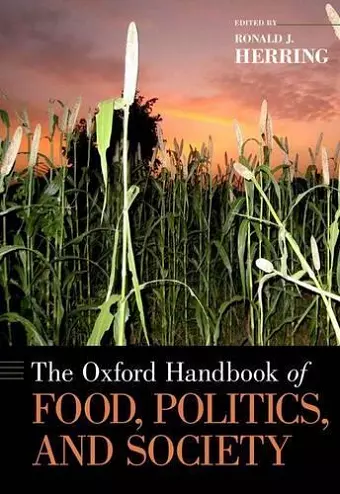The Oxford Handbook of Food, Politics, and Society
Format:Hardback
Publisher:Oxford University Press Inc
Published:19th Feb '15
Currently unavailable, and unfortunately no date known when it will be back

Politics decides who gets what and how. At the most elemental level, food has, for most of our history, been intensely political: who gets to eat what, how often, and through what means of acquisition or entitlement? The scale of the polity in question has shifted over time, from very local divisions to that of the international community imagined in the Millennium Development Goals of the United Nations. Simultaneously, the numbers and factional interests of people asserting political stakes in food and agriculture have likewise shifted up and out. For example, Europeans have used a variety of policy and social-movement tactics to influence what Africans eat; American diplomats have applied pressure to delegitimize European political choices about what not to eat; and conflicts over safety regulations have muddied the line between agricultural protectionism and justifiable precaution in confronting novel foods. As an object of governmentality, food has never been so prominent. The thirty-five chapters in this handbook confront three major themes in the political regulation of food: ecology, technology and property. Following Ronald J. Herring's editorial introduction, the first section examines power struggles over knowledge and authority in food technology and production: who gets to be the voice of authority in agricultural research and scientific knowledge; who decides the best ways to alleviate hunger in poor countries; and who decides issues of food safety and nutritional standards. The second section addresses the political economy of food production: land power and production; distribution and trade; land reform; food entitlements and welfare policy; agricultural subsidies; and agribusiness. The third section looks at agriculture and the environment: ecological approaches to agricultural development; sustainable farming; biotechnology; climate change; livestock; and wild foods. The fourth section addresses food politics and global civil society: global food systems; cultural debates over genetically modified foods; food safety; food labeling; the politics of grocery shopping; regulation of biotechnology; and coexistence of GM, organic and conventional crops. The fifth and final section looks at food movements and the frontiers of food politics: global food movements; organic farming as a transnational phenomenon; the intersection of local and global food narratives; the agrifood industry in developing countries; the agricultural land rush; and agricultural futures.
"...explores the analytical puzzles: why should food be politica and why is food knowledge contested?" -- Wonderpedia
ISBN: 9780195397772
Dimensions: 178mm x 249mm x 56mm
Weight: 1610g
904 pages